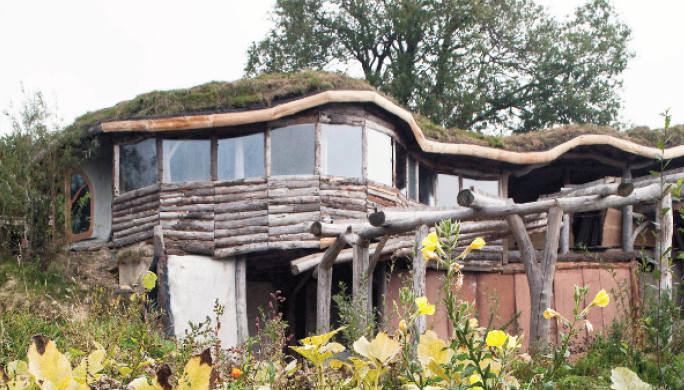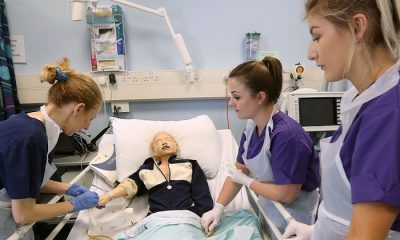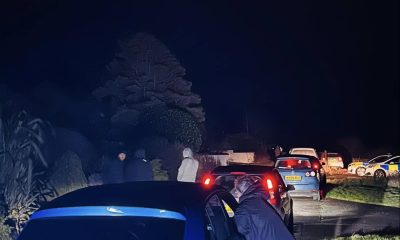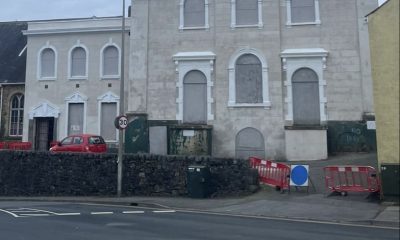News
Amazing eco-home costs family just £27,000


The exterior: The eco home took four years to build (Pic. Grand Designs)
BEGINNING with just £500, Simon and Jasmine Dale built a three-bedroom family home made with recycled goods and reclaimed material that’s being called ‘the cheapest house ever built in the Western Hemisphere’.
Living in the sustainable community of Lammas, in rural Pembrokeshire, Simon and Jasmine’s eco-home has been featured on the TV programme ‘Grand Designs’.
The home, made with reclaimed materials including glass, timber and insulating sheep’s wool, encompasses the family’s dream of living off the land with their children, Elfie and Cosmo.
Lammas is a pioneering sustainable village and in return for the right to build on the open farmland, Jasmine and Simon will have to prove that they had become self-sufficient on the seven acre plot within five years. If not, they will be forced to move on.
Featured on Wednesday’s (Oct 26) episode of Grand Designs, presenter Kevin McCloud told viewers: “This won’t be a cramped hobbit house, but a spacious, solid, three bed, low impact family home.”
Simon excavated 12 feet into the hillside in order to build a retaining wall along the back of the property, made from sandbags filled with excavated earth.
The floors of the eco-home are made from rammed earth, polished and hardened with linseed oil. The structure of the building comprises of round timber poles grown locally. The trees were then felled, prepared and cut by Simon.
The same poles were used to construct the roof, which was then covered in a damp proof membrane and insulated with sheep’s wool. A layer of grass was then planted on top for further insulation.
Due to delays caused by Welsh winter weather, the construction of the ‘Hobbit home’ took four years to complete.
In 2012, Simon had to postpone work on the eco home due to the wet weather; however, in the spring of 2013, he begun again, constructing the retaining walls made from hundreds of yellow sacks bought from eBay for 7p each. The sacks were filled with clay, sand and fine stone.
Simon and Jasmine planned to move their family into the property by autumn 2013 but, due to requirements of living at Lammas, they first had to set up a small business.
The family made the decision to postpone the main building work whilst they constructed greenhouses. During this time, Jasmine ran horticultural courses and Simon took on consultancy work in order to increase their original £500 fund.
Four years after beginning the project, Jasmine and Simon estimate that their eco home cost £27,000 to build, including the costs of £5,500 on sheep’s wool insulation and £5,000 work of vegetables used to feed volunteers.
Following the completion of their project, Simon commented: “I don’t think I could quantify it, but I can feel it in my heart when I walk around at the end of the day and see the bats flying round and hear the birds sing.
“It’s been hard and I wasn’t asking for an easy life. I like challenge. To put in a hard day’s graft and be tired at the end of the day. That exhaustion is a nice feeling.”
Community
RWE launches hydrogen education programme to inspire future climate champions

RWE has launched its Hydrogen Education Programme, an initiative aimed at educating schoolchildren about hydrogen’s crucial role in achieving net zero and decarbonising industries.
Developed in partnership with Generation C, the programme offers interactive, curriculum-based activities that connect classroom learning to real-world applications. Students of all ages will explore hydrogen’s properties, its production, and its growing role in industries driving the clean energy transition.
Henry Tudor High School in Pembroke has already piloted the programme with secondary school students, while Golden Grove Primary School is set to begin this week. The initiative will demonstrate how hydrogen, as a clean energy source, is integral to reducing emissions in transport, manufacturing, and energy sectors.
Engaging young minds
The programme features real-world case studies highlighting RWE’s hydrogen projects and includes group challenges designed to encourage critical thinking about global climate issues.
Golden Grove Primary School headteacher, Mr A Williams, welcomed the initiative, stating: “As head of a large primary school in Pembrokeshire, which is at the forefront of green energy growth, it is imperative that we build meaningful relationships with companies like RWE. The initial lesson captivated our learners, who now fully understand the importance of green energy and the new hydrogen plant. The flexibility of the New Welsh Curriculum allows us to tailor learning to our community’s needs—building an electrolyser to produce hydrogen is just the beginning of a journey that could lead to future opportunities in collaboration with businesses.”
Williams also highlighted the programme’s potential to shape future career paths, saying: “This project could provide highly skilled jobs in our county, and we need our learners to be at the forefront of that development.”
Building a sustainable future
Louise McDonnell, RWE’s hydrogen development manager, attended the event and emphasised the programme’s impact: “Our Hydrogen Education Programme equips young people with the knowledge and inspiration to make a difference. Hydrogen is a game-changer in the fight against climate change, and through this initiative, we’re helping students see the opportunities in clean energy. Education is key to building the skills and passion needed to achieve net zero and safeguard our planet.”
RWE’s Hydrogen Education Programme is more than just an awareness initiative—it aims to inspire careers in clean energy. By sparking curiosity in STEM (Science, Technology, Engineering, and Mathematics), the programme encourages students to explore future roles in the expanding hydrogen economy and renewable energy sector.
Hydrogen’s role in decarbonisation
RWE recently secured planning permission for the RWE Pembroke Green Hydrogen Project, a 100MWe electrolysis plant capable of producing approximately two metric tonnes of green hydrogen per hour. By replacing fossil fuels, the plant is expected to cut local CO2 emissions by about 93,000 tonnes annually, the equivalent of removing 18,600 cars from the road.
As the UK’s largest power producer and a leading renewable generator, RWE continues to develop hydrogen opportunities nationwide to support industrial decarbonisation and drive the transition to a cleaner energy future.
Crime
Victims of domestic violence avoiding homelessness thanks to pilot scheme

A PILOT initiative designed to help survivors of domestic abuse remain safely in their homes and reduce the risk of homelessness, has seen 76 Carmarthenshire residents protected in just six months.
The My Safe Place project, which is a partnership between Dyfed-Powys Police, the Office of the Police and Crime Commissioner (OPCC) and Carmarthenshire County Council, addresses significant gaps in support services, particularly for people living in their own or privately rented homes, who often can’t afford to implement necessary security measures.
Through providing interventions such as locks, alarms, fencing and other safety features, the program enables domestic abuse survivors to deter perpetrators and avoid the emotional and financial upheaval of relocating.
Constable Stephen Morris, Dyfed-Powys Police’s Designing Out Crime Officer, said: “If a domestic abuse survivor is living in privately owned or privately rented accommodation, very often they can not afford to carry out safeguarding recommendations.
“We identified this gap through speaking to and visiting domestic abuse victims and were able to secure funding to carry out security work and help people who were fleeing domestic abuse to stay in their own homes – preventing them becoming homeless.”
The initiative aligns closely with strategic priorities for housing and domestic abuse prevention, placing a strong emphasis on early intervention to prevent homelessness.
Recent evaluation found the majority of domestic abuse survivors felt safer in their homes after receiving support through My Safe Place, while an equally high percentage recommended the service as an alternative to moving.
“It is often all too easy to send people into refuge, but why should they have to? They are a victim of crime. Their children may go to school locally, they may have family living nearby or local support networks, so why should they have to leave? “In the long term, it is often not what they want. My job is to ensure extra security measures are in place so that the police can reach victims before the perpetrators.” PC Morris continued.
“The council housing team have also had training, so if one brave person declares themselves homeless due to domestic abuse, they can refer them directly to the police to give us the opportunity to intervene and support the victim, which is something that may not have happened previously.
“I’m pleased we have been able to able to utilise funds to help safeguard some of the most vulnerable victims from significant serious harm and plug this gap in provision.”
From April to October 2024, 76 people were supported by the scheme, with 20 interventions to those people living in properties they owned and 17 interventions to those living in private rented accommodation. 26 interventions were made to those living in local authority housing, four to people living in housing association and nine in Registered Social Landlord (RSL) properties.
Through consultation with Mid and West Wales Survivor’s Panel, it revealed victims face significant challenges in accessing home security measures while experiencing domestic abuse.
This gap in support was identified and addressed through funding provided by the OPCC and Carmarthenshire County Council, with delivery facilitated by the Safer Streets initiative. The Safer Streets mission is funded by the Home Office and aims to reduce serious harm and increase public confidence in policing and in the criminal justice system.
Joanne Edwards, Carmarthenshire County Council’s Commissioning and Contracting Manager, said: “As a pilot program, it underscores a firm commitment to easing the strain on homelessness and refuge services, while empowering victims to maintain stability for themselves and their families. Its core objectives include enhancing victims’ safety, reducing the risks posed by perpetrators, and providing a practical alternative to displacement.
“In its pilot phase, the project has demonstrated measurable success and strong stakeholder support. Regular reviews and feedback mechanisms are in place to maintain and enhance its effectiveness. As My Safe Place continues to grow, it holds the potential to serve as a model for future interventions aimed at supporting victims of domestic abuse and preventing homelessness.”

The scheme is another way Dyfed-Powys Police is demonstrating its commitment to helping eliminate domestic abuse.
PC Morris added: “I’m confident that should this scheme continue, it will successfully reduce the number of people declaring themselves as homeless to the council as a result of domestic abuse.”
Dyfed-Powys Police and Crime Commissioner Dafydd Llywelyn hoped the pilot scheme would help to empower survivors to stay in their own homes.
He said: “I am proud to support and partner on this scheme, which I hope will make a real difference to the lives of domestic abuse survivors. By addressing gaps in support and providing practical security measures, we want to empower survivors to feel safer in their own homes and reduce the risk of homelessness.
“Everyone deserves to feel secure and supported, and I believe this scheme has the potential to bring about lasting, positive change for those who need it most.”
If you need to report domestic abuse, stalking or harassment, you can contact Dyfed-Powys Police in the following ways:
- Report online: https://bit.ly/DPPContactOnline
- Email: [email protected]
- Call: 101
- If you are deaf, hard of hearing, or speech impaired text the non-emergency number on 07811 311 908
In an emergency, always call 999.
*If you feel you need support in contacting police, there are organisations that can help you.
Click here to find them, or search online for Live Fear Free, Women’s Aid or the National Stalking Helpline – all of which have free helplines available.
Business
UK Government Invests in Gigabit Broadband for South West Wales

THE UK GOVERNMENT has announced a further investment in Project Gigabit, aiming to deliver high-speed broadband to hard-to-reach areas across Britain. Rural towns and villages in South West Wales are among the latest to benefit, as part of a wider effort to achieve near-total gigabit coverage by 2030.
The programme, a key pillar of the Government’s Plan for Change, is designed to stimulate economic growth and remove barriers to opportunity. The latest rollout will bring some of the fastest broadband speeds available to remote communities, enhancing access to essential services such as healthcare, remote education, and video communication. It is also expected to support business growth and improve job opportunities for young people.
Welsh leaders welcome investment
Cllr Hazel Evans, of Carmarthenshire County Council, welcomed the announcement, saying: “This is a much-needed boost as we strive to improve digital connectivity across Carmarthenshire. Further investment will help ensure our rural communities continue to prosper as we transition towards a more digital society.”
Rob Stewart, Leader of Swansea Council and Chair of the Swansea Bay City Deal’s joint committee, also praised the initiative:
“This is fantastic news for the rural communities in our region. The Swansea Bay City Deal fully supports initiatives that improve the lives of people and businesses. This investment in digital infrastructure will create social and economic opportunities for communities that would otherwise be left behind.”
£289 million boost for broadband expansion
The announcement forms part of four new contracts worth over £289 million, aimed at delivering gigabit-capable broadband to approximately 131,000 homes and businesses across England and Wales.
Unlike traditional copper-based networks, gigabit connections provide faster and more reliable service, even during peak times. Households and businesses will no longer need to compete for bandwidth, as these high-speed networks allow multiple devices to operate seamlessly.
Welsh Secretary Jo Stevens highlighted the significance of the investment: “Powered by this UK Government funding, thousands more people and businesses across Wales will gain access to ultra-fast broadband. Our priority is to drive sustained economic growth, and to achieve this, we must ensure every part of Wales has full digital coverage as quickly as possible.”
Implementation and next steps
The Digital Infrastructure Programme is working closely with Building Digital UK (BDUK) and Openreach to deliver Project Gigabit. Further regional updates are expected in the coming months, outlining timeframes and specific locations set to benefit.
Upgrading and expanding existing networks is a complex process, requiring technical surveys and coordination between commercial providers and local authorities, including planning and highways departments. As a result, implementing gigabit-capable broadband can take time.
For further details about broadband plans in your area, residents are encouraged to contact their Digital Champion for more information.
-

 Crime3 days ago
Crime3 days agoMan charged with sexual penetration of seven-week-old baby in court
-

 News5 days ago
News5 days agoA48 crash: Four injured as police arrest man on suspicion of dangerous driving
-

 News3 days ago
News3 days agoBudget cuts under fire as financial challenges grip Carmarthenshire County Council
-

 Crime5 days ago
Crime5 days agoDyfed-Powys Police tax bill could rise by nine percent
-

 News7 days ago
News7 days agoGrandmother jailed for killing baby girl in Withybush Hospital crash
-

 News4 days ago
News4 days agoTraffic held on M4 after crash leaves car in central reservation
-

 News6 days ago
News6 days agoCounty councillor warns of dangerous and illegal E-scooter use in Haverfordwest
-

 Business2 days ago
Business2 days agoHarlech Foodservice steps in after Pembrokeshire Foods owners retire























